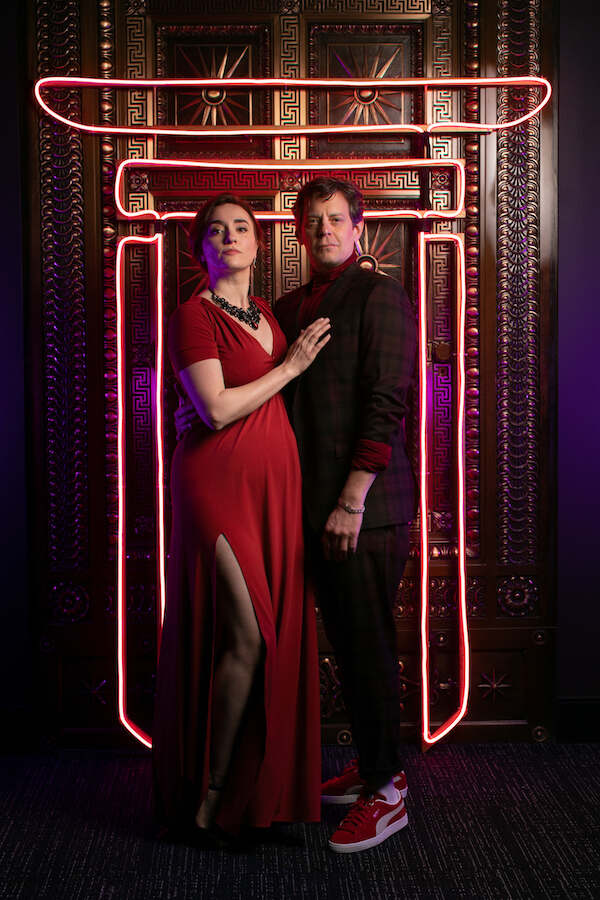It’s rare to see a play go from page to stage as quickly as The Devil Is a Lie touched down in front of a Pittsburgh audience. Playwright Jennifer Chang is still amazed that it happened at all.
She can chalk this remarkable feat up to Pittsburgh’s Quantum Theatre, an adventurous environmental company where compelling storytelling is never too challenging or too risky to get the green light. Rule-breaking is the norm. For example, in what may seem like a mortal sin at other performing arts events, smartphones are not only welcome at The Devil Is a Lie—they are integral to it.

Chang, a Californian known mostly as a director of unconventional works, wrote the modern-day Faustian tale, in part about a soulless tech magnate, all while fretting about the pandemic shutdown and the state of the human condition since the 2016 presidential election. The dark comedy leans into some serious stuff: free will, determinism, and the consequences of what we choose.
Audience polling that yields results within seconds is a key component of the show, and that requires robust WiFi, with audience members scanning a QR code and providing click-and-send answers that are quickly counted and displayed—all of which went off seemingly without a hitch during the work’s world-premiere weekend at a historic Pittsburgh office building.
Chang, who was in Pittsburgh for the opening on April 7 (the show runs through April 30), was beaming, still marveling at it all coming together. “I didn’t know if I would ever work again,” she had told me earlier in the the week over Zoom. “I thought theatre might never come back.” As a director who had not done much writing for public consumption, “I never thought this would see the light of day,” she said. “Maybe over Zoom, or online readings. This is all still amazing to me.”
The immersive, technologically challenging play got the thumbs up from Quantum founder and artistic director Karla Boos while it was still in preparation for its first in-person workshop. Once that decision was made, the next step was to find a space that suited the subject.
Quantum Theatre has for three decades staged theatrical events in places that might be unimaginable to others as performance worthy. These have included Pittsburgh hillsides, lakeshores, a former adult movie theatre, the Carrie Blast Furnaces—and that’s just a short list of its typically atypical sites.
The current production actually represents a departure from business as unusual: It’s the second Quantum experience in a row that is staged in a more or less traditional venue—though fully transformed by and for the work, of course. In October of last year, Quantum Theatre settled into the Pittsburgh Cultural Trust’s Byham Theater to introduce a stunning adaptation of the 18th-century opera Idaspe, created by Claire van Kampen, who directed, and Pittsburgh’s Chatham Baroque chamber orchestra.

At the Byham, Idaspe got a traditional proscenium staging. Not so The Devil Is a Lie, where the audience begins the evening at the top of a gleaming white marble staircase at the Tenant Innovation Center. Nestled in the corner of the Downtown Frick Building, it was erected in 1902 to please notorious industrialist Henry Clay Frick as the tallest building in Pittsburgh in its day—reportedly so it could hover over the nearby headquarters of Frick’s partner-turned-rival, Andrew Carnegie. What better place to tell Chang’s Faustian tale?


“One of the cool things about Quantum,” explained director Kyle Haden, “is that there’s no home, so it’s always about looking for the right site. When we started talking about this, Jen, who lives in California, talked about being in a Malibu mansion. But then, being in the home of industrialists, I was thinking about these kind of Gilded Age mansions, and I immediately thought about Frick and the other Frick mansion on the other side of town.”
When the Frick family left Pittsburgh to join New York society, they left behind Clayton, a mansion and grounds later endowed and gifted to the city by Frick’s daughter, Helen. But that historic site, which now offers tours, has many rules as to how it may be used—and remember, Quantum, and this particular work, require some rule-breaking. So the production landed in the Downtown Frick, still in use as an office building, with its grand entries, bronze accents, and stained-glass art.

“We’ll say that being in a building named for Pittsburgh’s most evil industrialist and doing a story about an evil tech billionaire, is inspiring. It’s…kismet,” said actor Sam Turich, who plays George Fast, the leader of the fictional company Voltaire, Inc., which has “its fingers in all your data.” Voltaire’s tagline is, “Your business is our business.”

If there had been a Voltaire dating app, it would surely have matched Chang and Quantum in a relationship of like-minded theatremakers. Instead it was Pittsburgh-based director Haden, who met Chang in a Drama League directors’ cohort. The two had “a very, very quick bond,” he said. So it was only natural that he was among the folks she shared her script with during the pandemic’s hellish work void and her doubts about the future. At that point, Chang said, she still didn’t know what she had, besides the encouragement to keep going.
“I was in a writing group for female directors, who were many illustrious names that people would recognize in theatre circles,” Chang recalled. “We would share pages and they would say, ‘Oh my goodness, Jennifer, you have to finish this play. There’s really something going on here.’ And then the time came when I needed people to just read it out loud and see what it was that we had on the page.”
Haden, an assistant professor in Carnegie Mellon’s School of Drama, brought the work to Quantum for its inQubator development program, and, after two readings it had its first in-person workshop. “That’s when Karla said, ‘Let’s just do this,’ ” Haden recalled.
The Devil Is a Lie begins in an area bar, where audience members are welcomed as Voltaire stock-holders and investors. Visible and adjacent is a space transformed into a venue fit to entertain VIPs and make important business and personal announcements. Dominated by a platform, surrounded on three sides by various seating arrangements, this area includes stands built by Quantum’s ingenious design team.
At one end, two large screens project poll results, while on their smartphones, participants can see how many people have entered choices. The screens hover over a dais that seems to be for a deejay—but little is as it seems in The Devil Is a Lie.

The dynamic cast of four comprises Turich as Fast, Christine Weber as his brilliant but complaint wife, Margarita, LaTrea Rembert as a deejay named Dogg, who just knows he’s at the wrong party, and Lisa Sanaye Dring as Lucy, a collector of souls. They deliver lines that, in context, are sure to trigger laughter in the moment, only to be considered later, perhaps while soul-searching about the choices you’ve made.
A good way to think about The Devil Is a Lie, even while enjoying a drink and the atmosphere of opulence, comes from a Devil’s disciple, who declares, “God gave you free will, but I give you choices.”
If you don’t see anything that suits your fancy, maybe the problem isn’t the choices—it’s what you want. If your choices are 1) adventurous, 2) innovative 3), fun 4), participation, or 5) all of the above, and you choose No. 5, welcome to the Devil’s party, and don’t forget to keep your phone turned on.
Sharon Eberson is a former Arts & Entertainment editor and theatre critic of the Pittsburgh Post-Gazette who currently writes and edits for the performing arts website onStage Pittsburgh.


